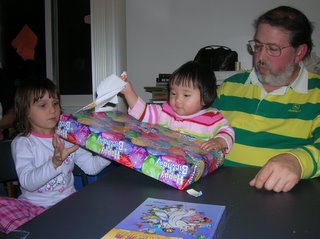I said in an earlier post that I'd been thinking about doing a post about discipline. I didn't do it because I didn't want it to become a rant. Then Addie said, " I'm curious about your discipline rant now. Do it!" So, if this turns into a rant, you all know who to blame. (I'm kidding...)
But, to keep Addie's mailbox from overflowing with hate mail, I'll try to keep myself civil... and you can direct your comments toward me if you have them.
I will preface this discussion with a hearty admission that most of these ideas were not mine, but belong to Tedd Tripp. I read them in his book
Shepherding a Child's Heart. Available wherever fine, Christian books are sold.
What I believe about discipline:
- The goal of discipline is not punishment. The goal is to help children change their hearts so that they want to do what is right, and they don't want to do what is wrong.
- The purpose of discipline is not to change behavior. If that was the purpose, we'd just call it manipulation. The purpose is to help children see that we have sinful hearts which want things that really are not good for us. Ultimately, discipline should lead a child to an understanding that obedience to mom and dad, and later, to God, is best for us. And we submit to authority because it is the best thing for us, even if it isn't always what we want.
- Discipline is a process, not an act. By this I mean that taking care of an "infraction" cannot be accomplished with a simple spanking, or a time out. Alone, these are just ways of convincing the child to act differently, without ever helping them to understand why their heart WANTS to be bad or how God can give them the desire to be good. In other words, alone, these methods amount to manipulation: so we have kids whose hearts still desire to sin, but perhaps they have been convinced not to. But humans can only act contrary to their hearts' desires for so long - eventually we all end up "following our hearts," to quote a popular phrase. So, if only the behavior is addressed, the heart will still cause a problem in the long run. (To this end, I have found that the process of discipline, arising from a single infraction, can be terribly inconvenient and, frankly, style cramping. So be it. If you want to know more about what that process looks like, I can post about that another time... or you can read Tedd Tripp's book.)
- Children should never have to guess about what they will be disciplined for. There is no "I've had enough of that!" When we let our limits determine whether our kids are disciplined, we confuse them. The message they hear is that right and wrong are negotiable. They are left to wonder why "X" wasn't a problem yesterday, but now (because mom is having a bad day?) they are being disciplined for it. IMO, this fosters the "it isn't wrong unless you get caught" theory. In addition, I think the "I'm fed up" type discipline totally negates the message we are trying to convey. Astute kids will figure out that discipline isn't really about what's best for them, rather it is about not annoying mom and dad. It seems more likely that kids will buck authority when they see discipline simply as a parental annoyance reducer, rather than as something that has produced benefits in their own lives. I guess the idea here is - be clear about what is and is not acceptable, then be consistent.
- There is a difference between authoritative parents, and authoritarian parents. The former are firm, but loving, and are interested in having their children learn from discipline. The latter want only obedience, no ifs, ands, or buts. The problem I see with most authoritarian parenting is that much of what those parents require of their kids is determined solely by the arbitrary desires/convenience of the parent. This kind of parenting is detrimental to children. (More about this in another post.)
- There is no room for bribery in discipline. Neither is their room for guilt-tripping. We remind. We teach. But we need to remind ourselves that we can't control. So when it comes down to it, they either go with what they've learned, or they don't. That means that for young children, when we see that they are about to disobey, we LET THEM (assuming their safety isn't compromised.) And then we discipline them. I think children have to be allowed to make their own (age-appropriate) choices. This is where kids learn what it means to earn trust too. If, in a certain situation, they have repeatedly shown their unwillingness to obey, then they don't get to be in that situation for a while.
Those are my initial thoughts. I have not touched upon the particular rant-provoking issue, because I think it might be a post all it's own.
So, let's hear it... comments, questions?
Labels: Parenting
 at
at 


















